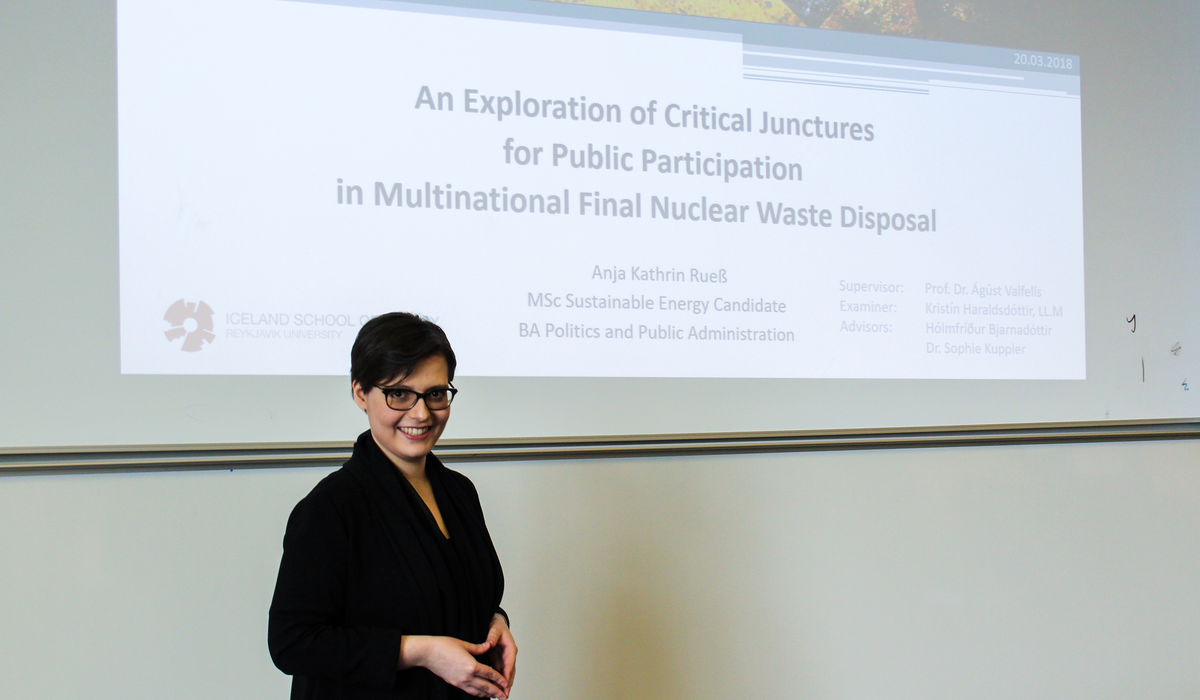MSc Thesis: An Exploration of Critical Junctures for Public Participation in Multinational Final Nuclear Waste Disposal
Anja Kathrin Ruess successfully defends her master's thesis
REYKJAVIK, March 21 – Yesterday, MSc of Sustainable Energy Science student at ISE, Anja Kathrin Ruess successfully defended her master's thesis project on exploring the critical junctures for public participation in multinational cooperation in joint nuclear waste repository. Anja was supervised by Ágúst Vafells from Reykjavik University.
 The aim of
Anja's work is to evaluate whether public participation in a multinational
repository scenario requires harmonization and identify the critical junctures.
Specifically, Anja defines harmonization as the specific effort to develop a
joint participation policy, while critical junctures are defined as the
barriers that need to be overcome. The impetus behind her research is the
“wicked problem” surrounding the topic on joint nuclear waste repository. At
the early stage of her literature search, Anja found evidence that public
participation in decision making has led to better results.
The aim of
Anja's work is to evaluate whether public participation in a multinational
repository scenario requires harmonization and identify the critical junctures.
Specifically, Anja defines harmonization as the specific effort to develop a
joint participation policy, while critical junctures are defined as the
barriers that need to be overcome. The impetus behind her research is the
“wicked problem” surrounding the topic on joint nuclear waste repository. At
the early stage of her literature search, Anja found evidence that public
participation in decision making has led to better results.
Anja divides her research question into three dimensions: technological, legal, and political spheres. Her main focus, however, is on assessing public participation from a political point of view. To answer this question, Anja uses the case study on Austria - Denmark - The Netherlands. Despite similar democratic systems and integration in the common EU legal framework, variations between the approaches to public participation still persist in these countries.
In the technological sphere, Anja finds that there are disparities in the composition waste inventories and in the future sources of waste in these countries. In the legal sphere, there are no observable critical junctures. An important point that Anja brought to surface was the vague terminology used in the legal framework used to define public participation, with Austria less specific in how they envisage public participation. In the political dimension, Anja conducts both quantitative and qualitative analysis. In her quantitative analysis, Anja gathers the number of words in political documents that are associated with participation. The results indicate an urgent need for increased public participation in these countries; Austria at 0.57%, Denmark at 0.52%, and the Netherlands at 0.61%. The qualitative analysis indicates that there are asymmetric notions of public participation in the studied countries.
The limitations of these analyses are that participatory culture can only be approximated. Additionally, the proxy context introduces a source of bias and due to the nature of the study, results cannot be generalized. However, the contribution from Anja's work cannot be undermined since there is currently very limited research and data available in this particular area. The result of her study establishes that public participation, especially those that involve multinational agreements, require harmonization. In other words, dealing with variations in how public participation are envisaged requires reaching a common understanding between countries and developing a joint policy. To read more about her work, click on the following link .
Congratulations Anja on an excellent thesis!
